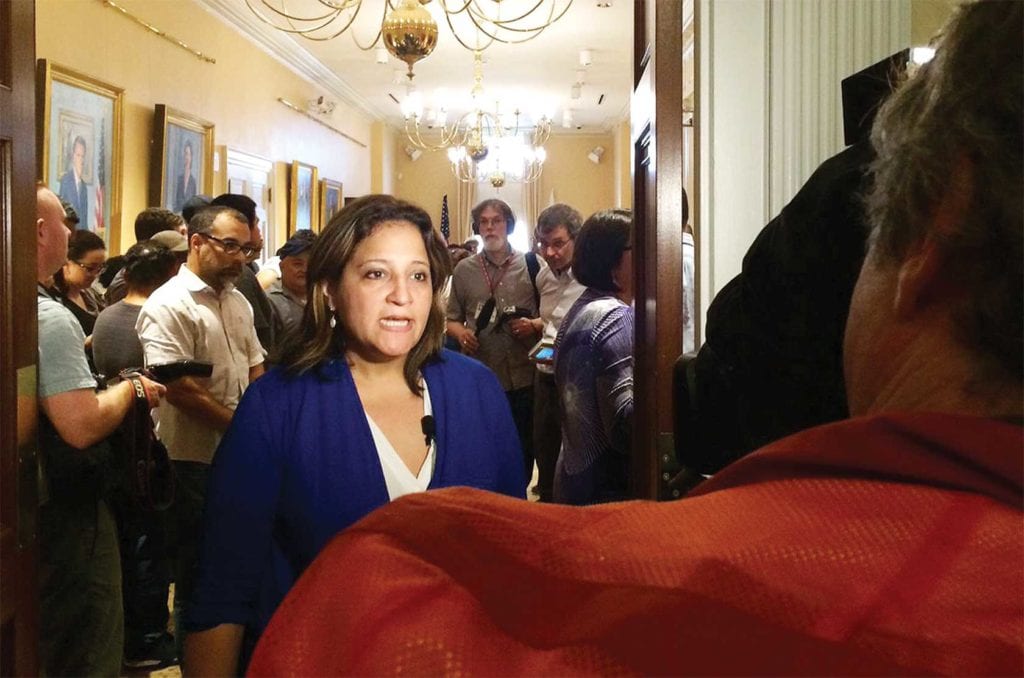Billionaires profit, workers struggle
Report recommends government interventions to protect workers

While many Americans are experiencing unemployment and small businesses are struggling during the ongoing COVID-19 pandemic, billionaires and large corporations are doing remarkably well.
In the eight months since states went on lockdown in March, 647 billionaires in the United States have seen their wealth increase by $960 billion, according to a report released last week by the Institute for Policy Studies, a Washington, D.C.-based progressive think tank. Meanwhile, frontline and low-wage workers have faced dangerous working conditions, furloughs, layoffs and evictions.
“Hundreds of thousands of people are putting their lives at risk, and you have a group of people who are benefiting in tremendous ways,” said Sara Myklebust, research director at Georgetown University’s Kalmanovitz Initiative for Labor and the Working Poor.
Those raking in record profits include Amazon founder Jeff Bezos, Walmart heirs Alice and Jim Walton and Instacart founder Apoorva Mehta. They are among the top 10 earners who have a combined wealth of $477 billion and have seen their fortunes rise by $127 billion since the beginning of the pandemic.
At the same time, employees of the firms that have earned those billionaires’ profits have suffered through dangerous working conditions and many, including nearly 20,000 Amazon workers, have suffered through COVID-19 infections. Instacart’s Mehta became a billionaire in June and is now worth $1.6 billion. His employees, who buy groceries for clients, are not given adequate personal protective equipment, the report’s authors say.
“Those on the front lines are disproportionately female and people of color, particularly Black workers, and nearly a quarter live in families struggling below the poverty line,” the report reads. “Those frontline workers are the ones actually creating wealth, only to have it directed into the pockets of the billionaires.”
In Massachusetts, the conditions for workers labeled “essential” and those unable to work remotely have been dire under the pandemic, says SEIU 32BJ Vice President Roxana Rivera. Rivera’s union members work in janitorial and security jobs in the Greater Boston area and live in many of the neighborhoods and cities with the highest COVID-19 infection rates.
“It’s been a very painful time, especially because of the loss of life,” she told the Banner. “It’s not about getting a raise for workers. It’s about whether they live or die.”
Because white-collar workers who normally fill Boston area office buildings are working remotely, many of those who clean and provide security in those buildings found themselves out of work in March and April. Rivera says 4,000 of her unions 20,000 members were laid off then.
Although building managers and owners hired back 2,000 of those laid off, many are fearful that the current surge in COVID cases will prompt a fresh round of layoffs.
“The level of anxiety is really high,” Rivera said. “Those who have jobs are fearful they won’t continue to have a paycheck. For those who have been laid off in March and April, they’re coming up on the end of their benefits.”
Worker protections
The report’s recommendations include that employers add hazard pay of at least $5 an hour for workers in jobs that put them at risk of contracting COVID-19; that corporations provide sick leave benefits for workers to stay home when ill or when exposed to the coronavirus; that employers provide and replace high-quality personal protective equipment at no cost to the workers; and that Congress pass an “Essential Workers Bill of Rights” package of worker protections.
The report, titled “Billionaire Bonanza 2020: Wealth Windfalls, Tumbling Taxes, and Pandemic Profiteers,” also recommends that the federal government levy an “Emergency Pandemic Wealth Tax” on billionaires sufficient to channel $450 billion to fund worker protection measures. The report also recommends closing corporate tax loopholes that allow corporations and private-equity billionaires to pay lower tax rates.
In Mass., a push for progressive taxation
Locally, Somerville Rep. Michael Connolly proposed a budget amendment that would have raised the tax on long-term capital gains, investment interest and dividends to 9% from the current 5% and channeled the projected $1.7 billion in added revenue to relief for the unemployed and for small businesses.
“A lot of people look at the situation we’re in and try to pit public health against the economy,” he said. “What we need to recognize is that we have to protect the public health in order to have economic recovery. We need to make investments in certain areas and we need to protect our most vulnerable residents.”
Connolly’s budget amendment did not pass. Legislative leadership has so far not taken steps to raise taxes, instead relying on $1.5 billion in rainy day funds — revenue the Legislature keeps in reserve to use during economic downturns.
Connolly supports paid emergency sick time, a ban on evictions and foreclosures, and other measures to protect low-income workers and those who have lost employment. But such measures would likely require hundreds of millions of dollars in relief from state government. That’s a commitment he says government should be willing to make.
“The governor is talking about personal responsibility,” he said. “Personal responsibility has its place, but we as a state have a responsibility to provide for people so they can stay safe.”







